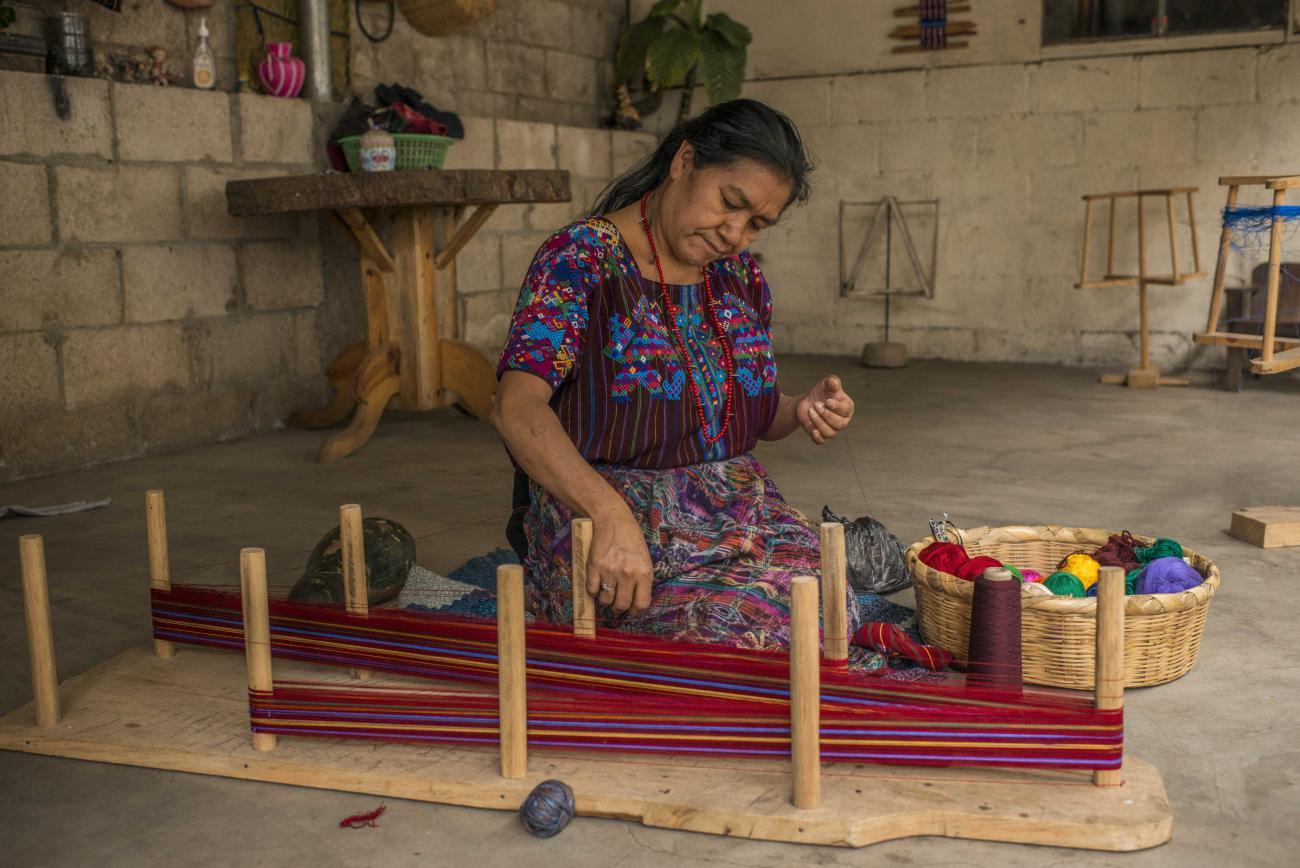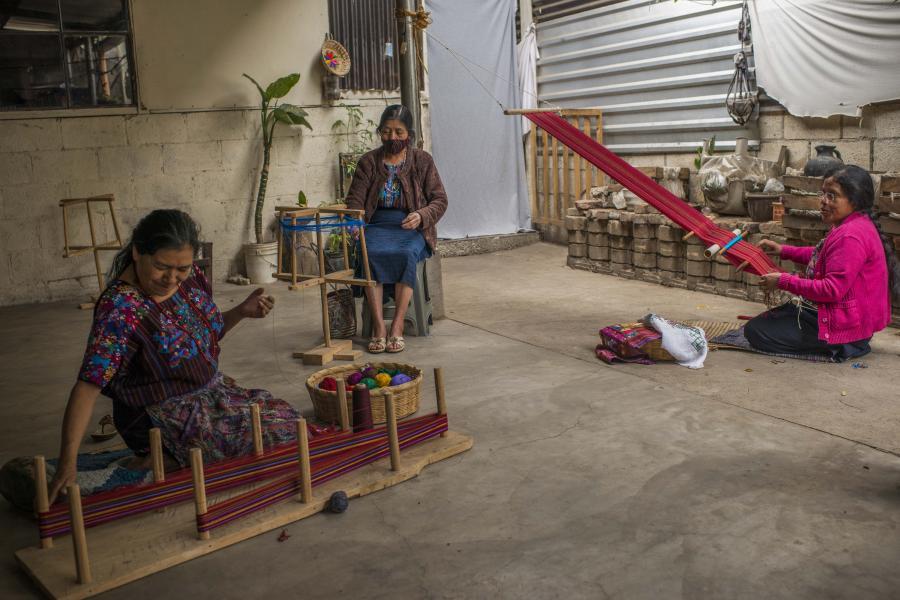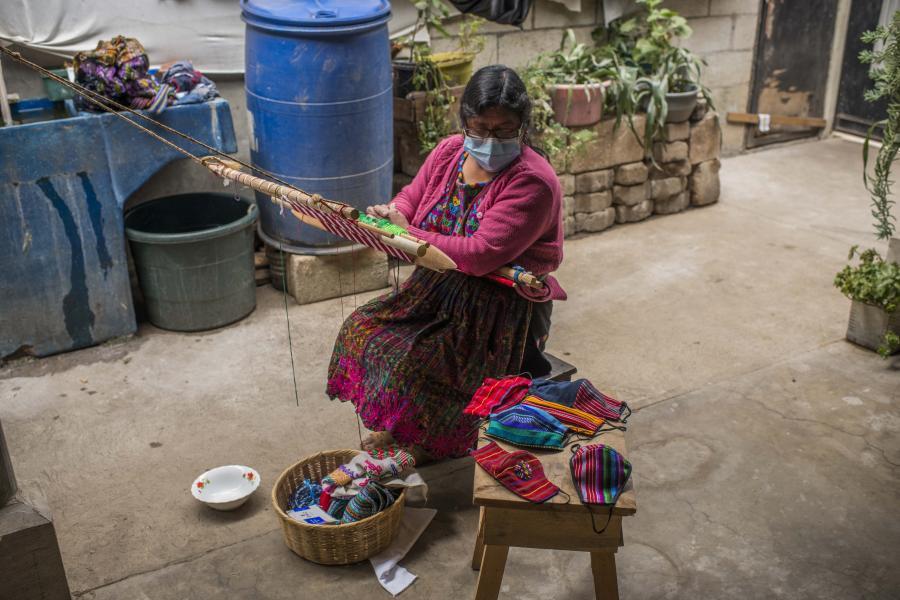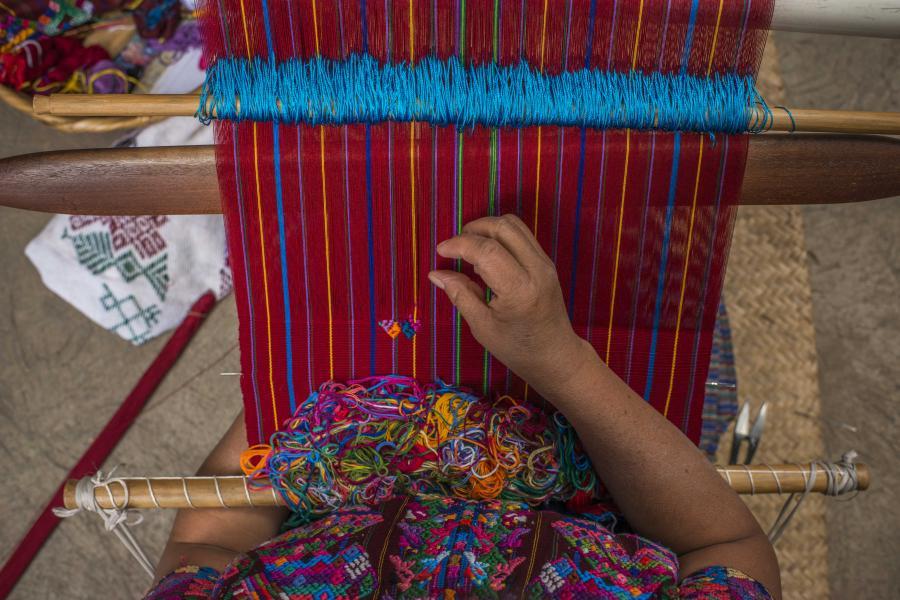Spinning human rights in Guatemala: the struggle of the Mayan weavers

The pandemic brought unemployment, scarcity, and poverty, which added to the historical economic precariousness of the people from the Guatemalan highlands.
Tuesday, February 23, 2021. In the morning the market is just beginning to rekindle some of the usual fervor that used to be perceived before the pandemic. In front of the facade of the Cathedral of Santo Domingo, Sacatepéquez, the traditional noise
of the vendors and the frantic pace of the customers, mixed in a whirlwind of colors and smells, is just beginning to come alive again, slowly, after so many, too many months of restrictions due to the pandemic. As elsewhere in the country, the pandemic brought unemployment, scarcity, and poverty, which added to the historical economic precariousness of the people from the Guatemalan highlands.
In the courtyard of Angela Felicita Sujuyuj's house, the slight sound of the waist loom never stops. Today she is accompanied by Gloria Estela García and Marta Elisabeth Hernández. The three of them are members of the council of weavers of the community, members of the National Movement of Weavers and founders of the Women's Association for the Development of Sacatepéquez -AFEDES-. Together with their looms, they lead a life of struggle and resistance in defense of the rights of indigenous women and their ancestral expressions, which are reflected in their traditional costumes.

Thanks to their organization they established a historical precedent. On November 6, 2020, they managed to occupy the front pages of the national press, when the Constitutional Court (CC) ruled in their favor a legal action against the Guatemalan Institute of Tourism -INGUAT- for using the image of women weaves as an object of commercialization and folklorization. In the action for legal protection, it was denounced the systematic exclusion, especially of the weavers, as direct beneficiaries of the income generated by the State through tourism. This despite the fact, that their faces are used to promote the “Heart of the Mayan World”, a slogan which tourists are promoted to visit the country. The National Movement of Weavers demanded that INGUAT refrain from continuing with these practices and that the State adopt administrative measures and public policies that include benefits for indigenous women weavers. In its decision in favor, the CC requested INGUAT to "implement adequate participation mechanisms that allow the real and effective participation of the different collectives of indigenous peoples in the formulation and design of public policies on the matter, specifically those expected to affect their rights, through legitimate representatives, elected according to their own forms of organization."
The National Movement of Weavers is not the first judicial victory. It was born in 2014 with more than 600 weavers and the support of AFEDES. With its creation, it began the legal battle to claim the recognition and protection of the copyright of designs, textiles, and clothing, counting along the way with the technical assistance of the Office of the United Nations High Commissioner for Human Rights -OHCHR-, support that continues today. Thus, two years later, in 2016 the Movement filed an action of unconstitutionality before the CC, requesting the modification of some articles of several laws, including the Law on Protection, Artisanal Development and the Law on Copyright and Related Rights, to guarantee the right of collective intellectual property, especially of textiles and clothing from indigenous peoples. In 2017, the CC issued a landmark ruling urging the Congress of the Republic to issue a specific law from indigenous peoples establishing mechanisms to protect the collective intellectual property. However, to date, this law has not yet been approved.
With a firm look, Angelina Aspuac, coordinator of the National Weavers' Movement and common representative in the legal proceedings, explains that the recent legal battle goes beyond the legal fight: “it is about dignity, because as long as none of these changes, it is we, the women weavers, who continue to pay the economic cost and who subsidize those who profit from our textiles. It's more about dignity than anything else.”

Dignity. The feeling of self-esteem linked to ethnic and cultural belonging to a territory and its vindication in a country where racism and exclusion are evident. This has been the challenge of a lifetime for the women of AFEDES. Gloria Estela García explains it with a smile and very direct language, while her colleagues do not take their eyes off the threads they continue to weave. Originally from Totonicapán, Gloria explains that she began to realize what racism was in Guatemala at the age of 7, when she started doing domestic work in the homes of neighbors. She began to feel the class contempt, the discrimination she received for being the “maid” of the house, the “servant.” This condition crystallized dramatically at the age of 11, when, out of necessity, she went to look for work in the capital city. “Since I was discriminated against, I have never worked as a maid again, even if I had to eat only tortillas with salt, I will never work in houses again,” says García, absolutely convinced. When she moved, she found that in Guatemala there were two parallel worlds: the world of the rich and the world of the poor, indigenous and mestizos. My mother used to say to me when I protested, “Keep your head down, but I didn't keep my head down, that's why I always lasted only a short time in the workplace,” García says proudly.
As an adult living in Santo Domingo, Sacatepéquez, García found her main weapon of defense against discrimination: collective organization. In 2009, she joined with other weavers to create the Council of Weavers, in response to the threats its members faced in defense of their indigenous cultural identity and their rights as workers and merchants.
The Council of Weavers had to protect itself from several attempts of appropriation of their work techniques by institutions and individuals who, over the last decade, have tried to take ownership not only of their products, but also of the production rights, violating the cultural legacy that the traditional costume represents in the cultural identity of indigenous peoples. At first, the visits from businesspeople and some institutions were welcome: as merchants, the women needed to expand their sales network in the country. But they quickly understood the dishonesty. “We got scared,” says García about the last visit, when it became clear that people from outside their community were imposing different ways of producing and, above all, with the purpose of taking over the rights to produce their weavings. “How is it going to be their design, if I'm putting my own design there... and it's not even mine, if it belongs to the people, because I brought it from my ancestors,” the weaver denounces. To commercialize culture, to sell identity, without, in addition, recognizing to the depositors a fair price - as if it were a price to be discussed -.
The straw that broke the camel's back was when a businesswoman from the capital, during her time as a university student, approached García with the pretext of conducting a study on the cultural traditions of the place linked to typical weaving, and a few years later, began to promote her line of typical handbags to the four winds
on social networks. When García found out that the promotional videos, recorded during the university student's friendly field study sessions, had her face as the protagonist, she was so outraged that she filed a complaint with the Public Prosecutor's Office. The prosecutor who received her complaint questioned the reasons for the weaver's anger, arguing that it was not a bad thing that the exclusive line of typical bags was named after the Virgin Mary, just as, in the common racist imaginary of the country, all the indigenous women of the highlands. “I had a very mixed feeling, I didn't know whether to laugh or explode with anger,” says García.

The weavers' battles in defense of cultural heritage have not only taken place in courtrooms. Last year, the whole world was paralyzed by the danger of a pandemic and the economic recession was noticeable everywhere. Again, in Santo Domingo, Sacatepéquez, the organization managed to create a system of internal solidarity where those who had a little more supported the neediest, but the months were long and still, the weavers argue, the crisis is not over.
During the confinement, the OHCHR continued to be in contact with Angelina to push for compliance with the CC's ruling. In one of the conversations, Angelina asked the
OHCHR to carry out an action that could alleviate, even a little, the precarious situation of the weavers who had lost their income due to the impossibility of selling their products. This conversation led to a specific action: the purchase by the OHCHR of 3,000 masks made by the weavers. The masks would carry a brief history of the Movement and the demand for their rights.
“The 3,000 masks have served to alleviate some of the economic crisis in our homes,” says Angelina. She also explains that, through this new model of cooperation with the OHCHR, the masks were distributed to diplomatic bodies and institutions in the country “fulfilling the strategy of maintaining high political attention on our case and promoting the law in favor of the cultural and economic rights of the Mayan weavers, which is stalled in Congress.”
Mika Kanervavuori, OHCHR Representative in Guatemala, remarks: “I had the opportunity to learn first-hand about the work of the National Weavers' Movement and the organization AFEDES when I visited them in Sacatepéquez last year. Their commitment to reclaiming collective intellectual property rights over their weavings and clothing is admirable. I hope that the social, economic, and political fabric of the Movement's efforts be successful in the near future.”
Translated by: Jackeline Lemus
University intern - UMG



